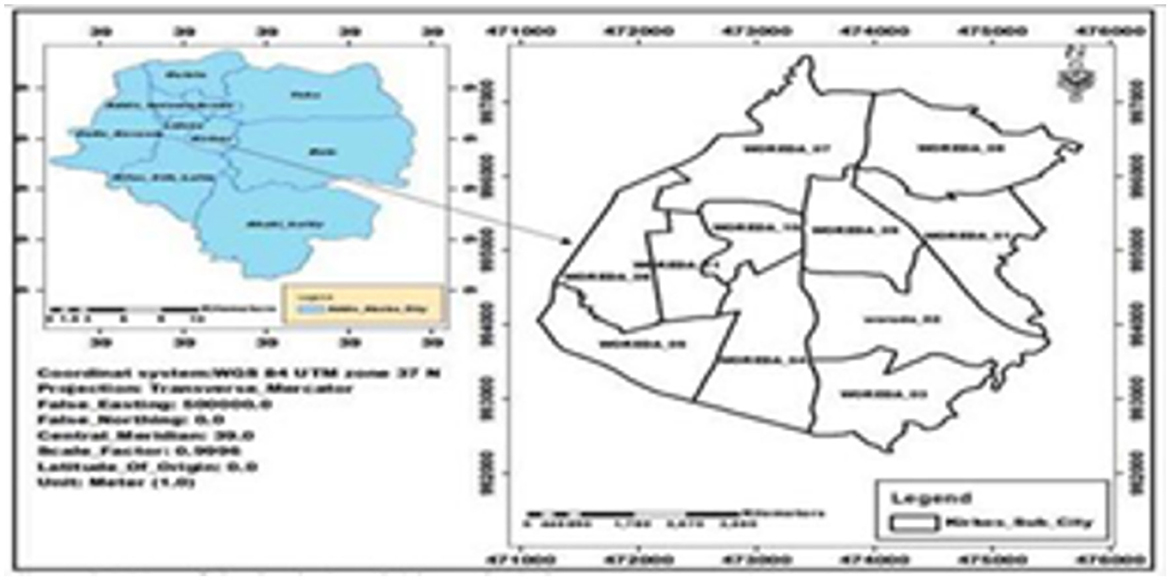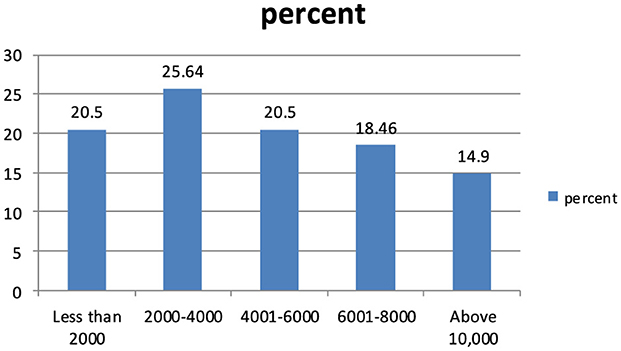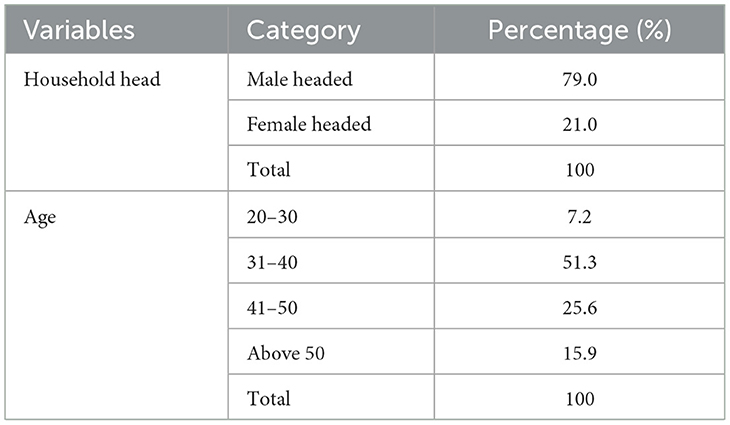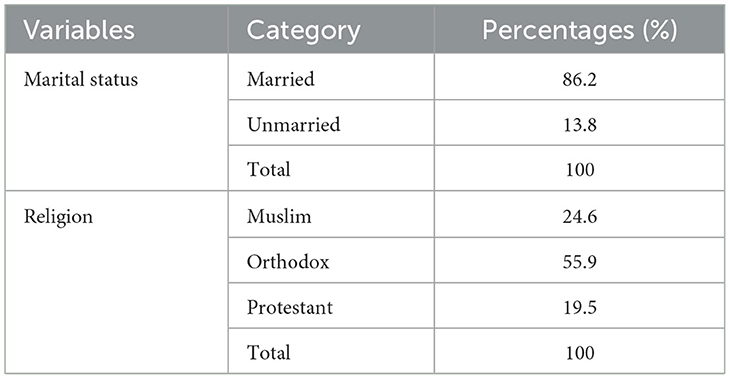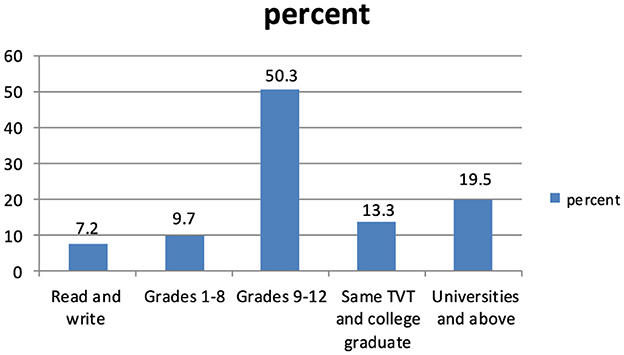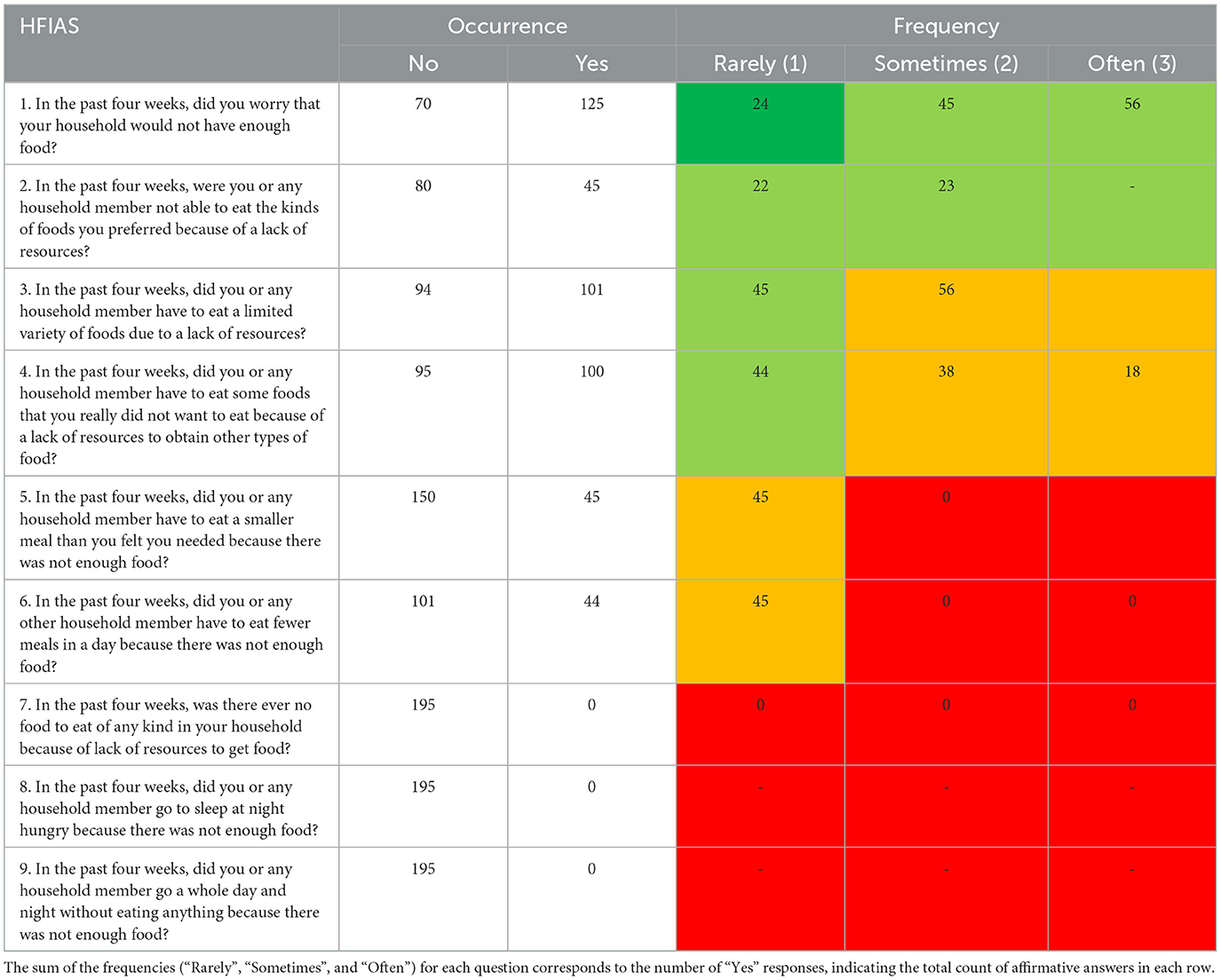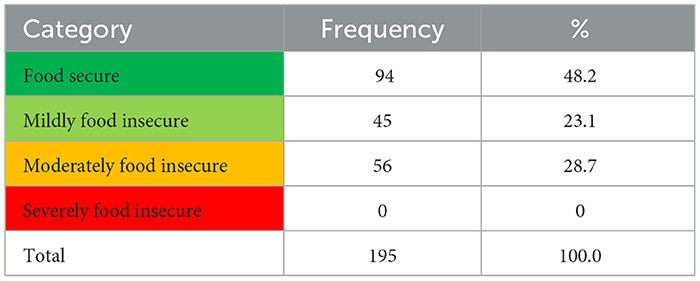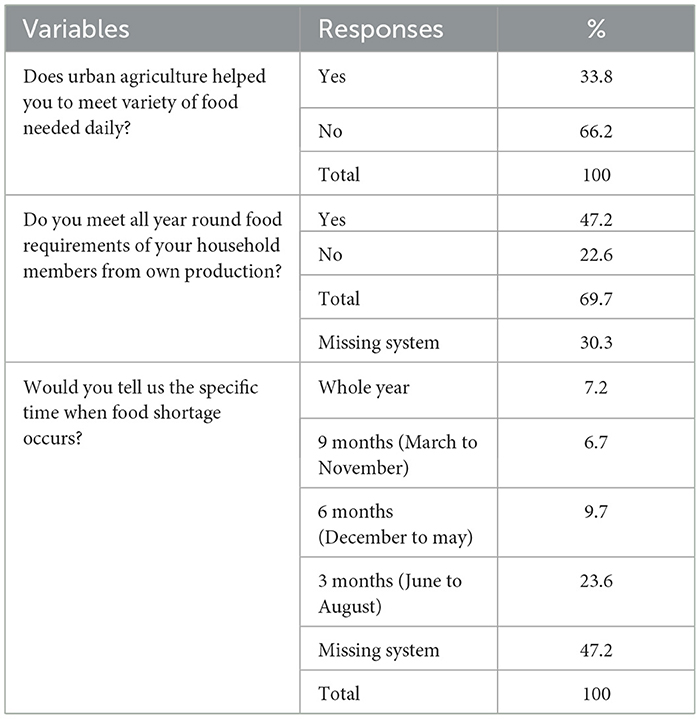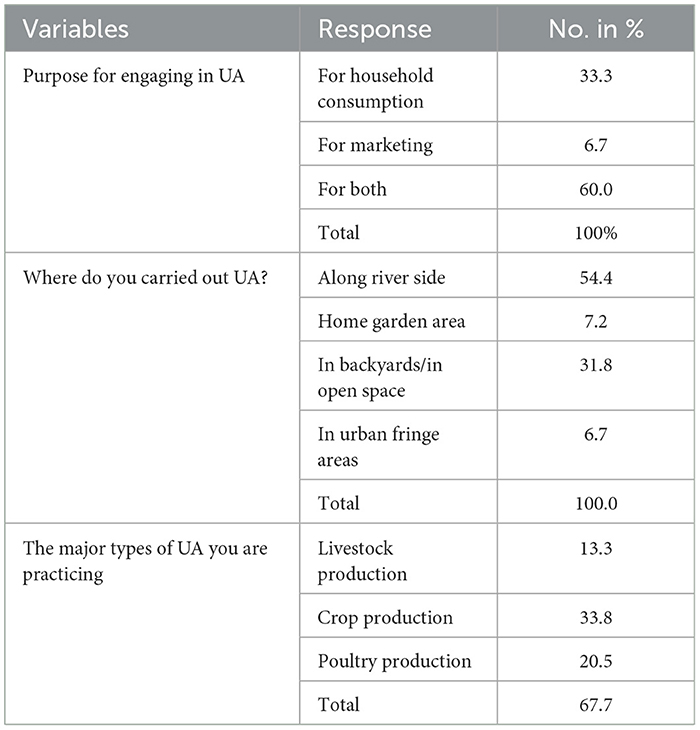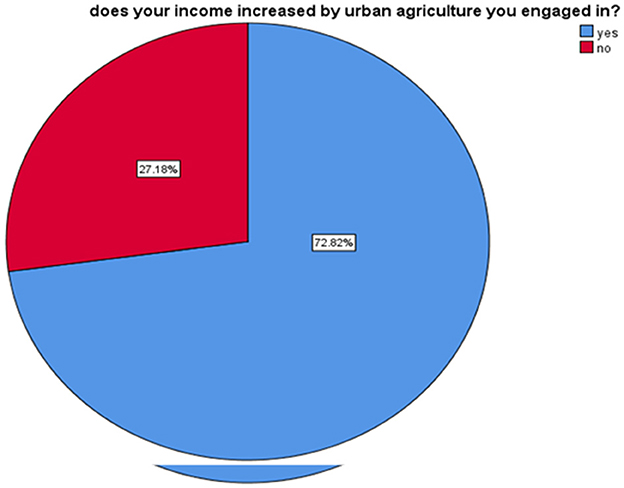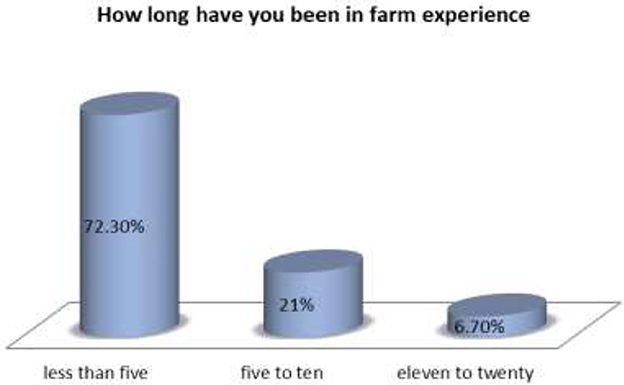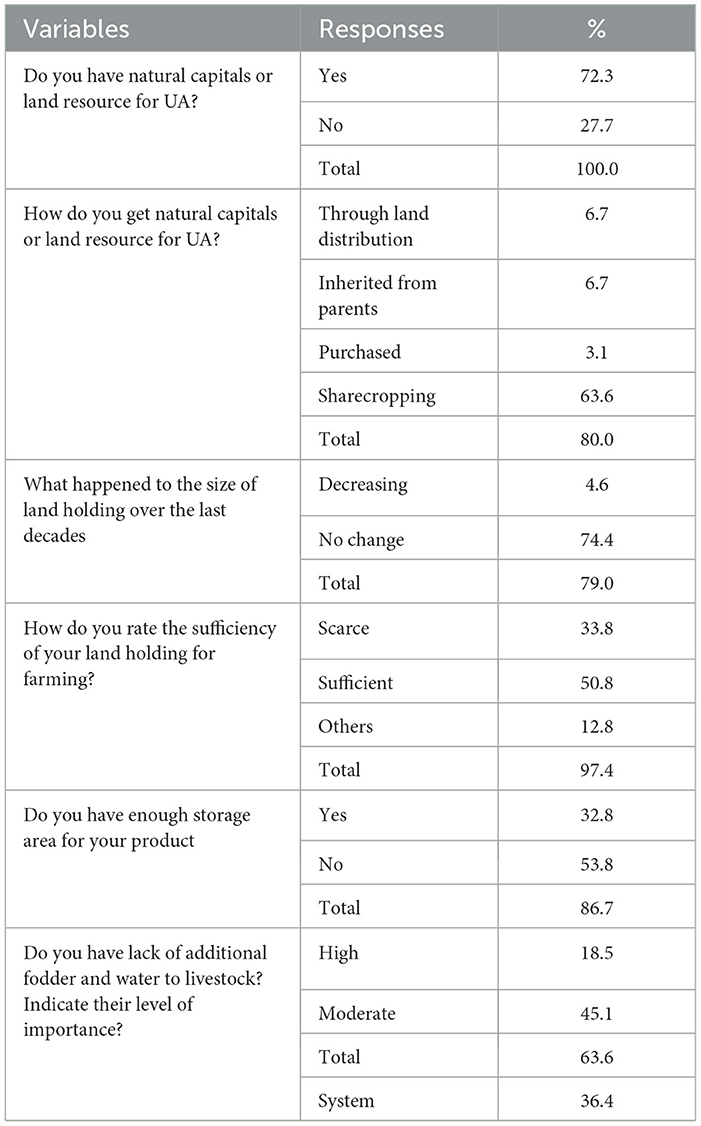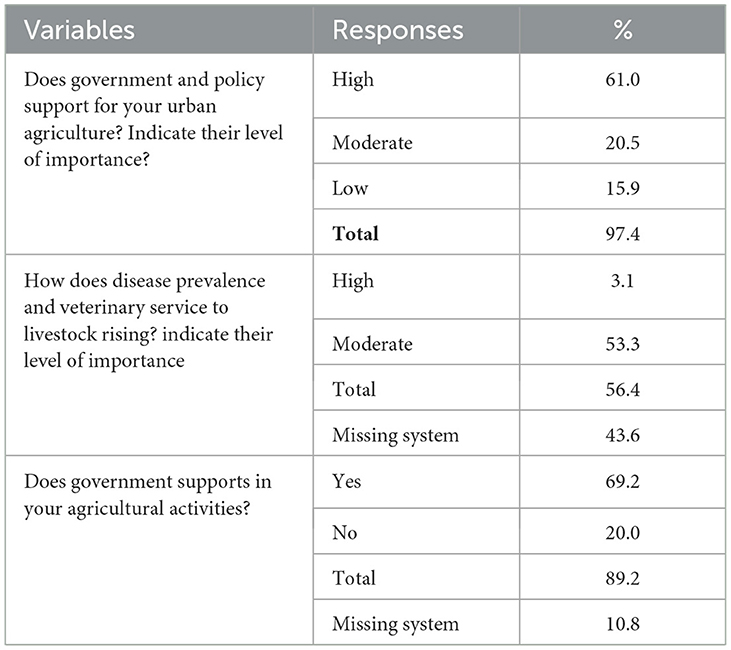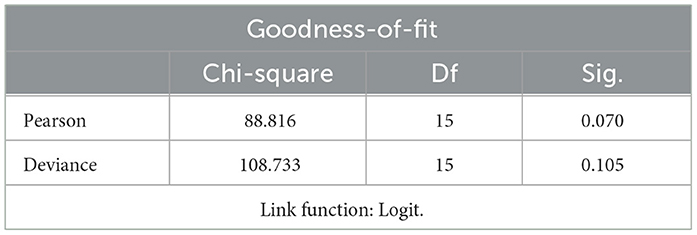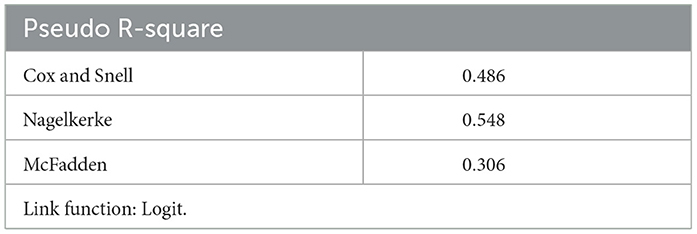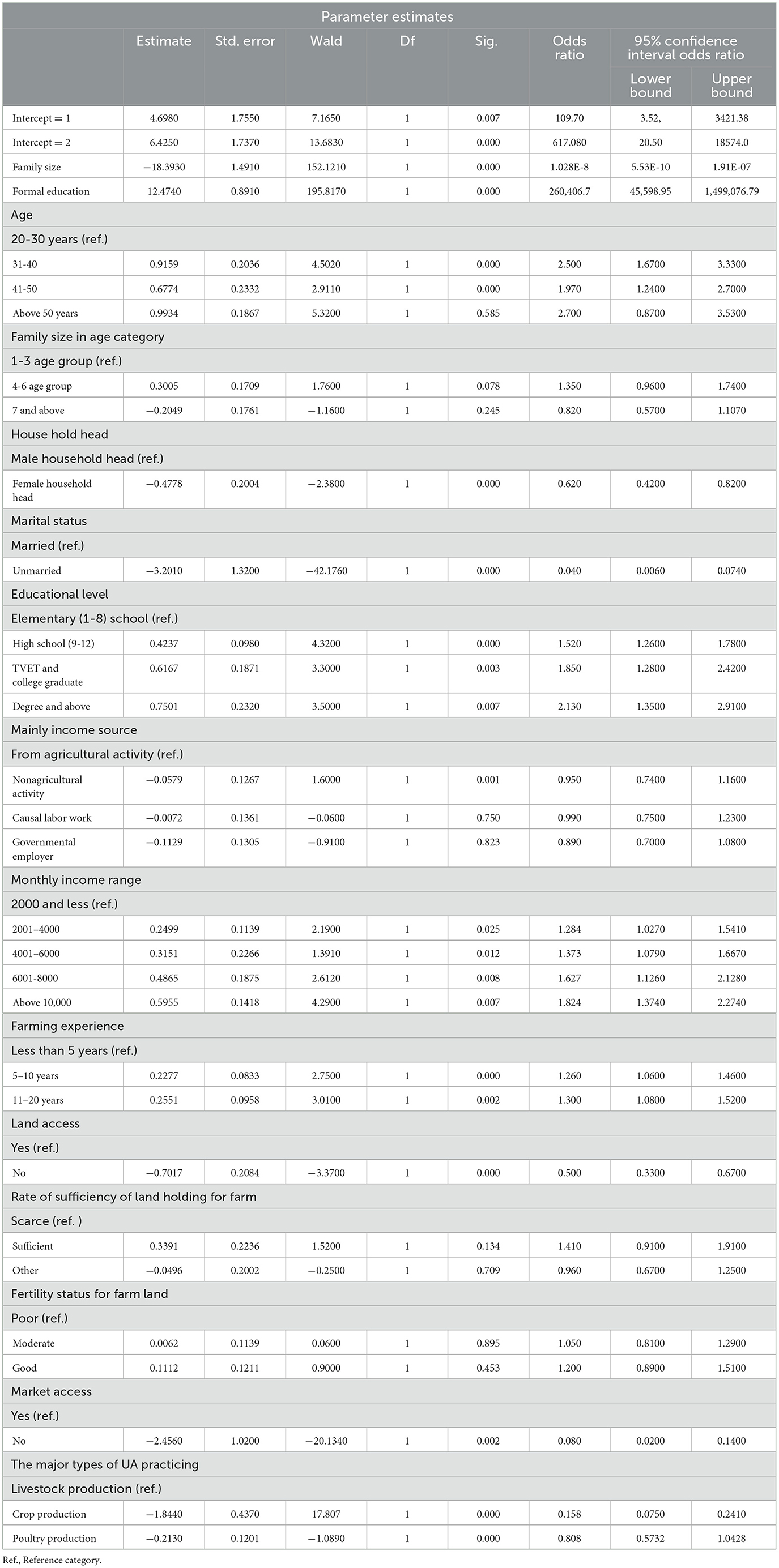- 1Department of Foreign Relation, Ethiopian Biotechnology Institute, Addis Ababa City, Ethiopia
- 2Department of Statistics, Salale University, Fiche, Ethiopia
Introduction: The main objective of the study was to explore the contribution of urban agriculture (UA) to the household food security of urban farmers in Addis Ababa, using Kirkos Subcity as a case study.
Methods: Both quantitative and qualitative research approaches were employed to ascertain and describe the characteristics of variables of interest. The data collection involved surveys and interviews with urban farmers.
Results: The study revealed that 48.2% of respondents were food secure, while 23.1% and 28.7% were mildly or moderately food insecure, respectively. Additionally, 33.8% of respondents believed that urban agriculture helped them meet their daily food needs, while the remaining respondents felt it was insufficient. Approximately 47.2% of respondents reported that UA helped them meet their food requirements year-round, whereas 22.6% said it was unable to cover their year-round needs. Most respondents indicated that their income increased due to engaging in urban agriculture. Furthermore, 72.3% of respondents had access to land resources for urban agriculture, while 27.7% did not have access to land. The ordinal logistic regression model indicated that age, family size, formal education, household head, monthly income, marital status, educational level, main income source, farming experience, land access, and market access were statistically significant predictors of household food security.
Discussion: The prevalence of food insecurity among urban households engaged in agriculture highlights the need for additional support and increased intensity of various types of urban agriculture. Policymakers should consider integrating urban agriculture into urban planning strategies to enhance food security and resilience in urban areas.
1 Introduction
The global population is increasingly urban, a trend set to surpass the rural population for the first time in history (FAO, 2001). This rapid urbanization poses significant challenges for cities, particularly in addressing food security concerns. As cities grow, the need to feed their expanding populations becomes more pressing, exacerbating vulnerabilities related to social and ecological systems (Drescher, 1996). In urban areas, food security largely hinges on household income and access to efficient grocery systems. Urban agriculture (UA) has emerged as a critical solution, providing opportunities for food production within city limits. Unlike rural agriculture, which typically occupies large, contiguous plots of land, UA often operates on smaller, more fragmented spaces. Despite its limited spatial scope, UA makes more efficient use of land and water resources, integrates agricultural systems effectively, and offers higher yields with a diverse range of crops and livestock (Maugeot, 2000).
UA is increasingly recognized as a solution to the challenges of urbanization, poverty, and food insecurity, particularly in developing economies. It offers a pathway for socio-economically disadvantaged groups to improve their food security, nutrition, and income levels (Mkwambisi et al., 2011). In sub-Saharan Africa, the persistence of farming activities as a primary or secondary income source indicates the ongoing importance of UA within the informal sector (de Bon et al., 2010). However, despite its significant role in urban economies, UA in Ethiopia has received limited attention, particularly in terms of policy support and research into its socio-economic relevance.
The challenge of addressing food insecurity in urban areas of Sub-Saharan Africa (SSA) is crucial for achieving the United Nations' Sustainable Development Goals, particularly those aimed at eradicating hunger and poverty (Davies et al., 2021; Pérez-Escamilla and Causa, 2017; United Nations, 2015; Dube et al., 2021) emphasize that meeting these goals depends heavily on how cities in developing countries are planned, governed, and managed, alongside the implementation of targeted policy initiatives to improve food security. One promising solution is the promotion of urban agriculture, which has the potential to supply fresh, affordable, and nutritious food to urban populations (Ocho et al., 2017; Mougeot, 2005; Pauleit et al., 2019; Korir et al., 2015). Urban agriculture can be defined as the use of small urban spaces—such as vacant lots, gardens, roadsides, balconies, or containers for growing crops or raising small livestock for personal consumption or local market sales (Poulsen et al., 2015).
Urban agriculture in Ethiopia has been largely overlooked and remains an under-researched area, receiving minimal attention from scholars. Consequently, there is a pressing need for more empirical studies to explore the extent and impact of urban agriculture within Ethiopian cities. Such research is vital to provide evidence-based insights for policymakers and urban planners and to encourage further academic inquiry in this field (Yalew, 2020). Addis Ababa, with its favorable agro-ecological conditions for horticulture and animal husbandry, offers significant potential for urban agriculture. The city's proximity to a large market facilitates the production of high-value perishable products, such as green leafy vegetables, fluid milk, yogurt, and cheese. Moreover, the availability of agricultural inputs, services, and infrastructure makes urban farming a viable and appealing option for city residents. Nevertheless, UA in Addis Ababa faces several constraints, including a lack of supportive policies, institutional instability, and insufficient technical support. The rapid population growth and competition for land further constrain the expansion of UA activities (Mandefro, 2010).
Despite these challenges, there is a notable gap in research regarding the contribution of UA to food security and socio-economic development in urban contexts. This study aims to address this gap by exploring the role of UA in enhancing household food security and income in Addis Ababa, specifically focusing on the Kirkos Sub City. By examining the socio-economic impact of UA, this research will contribute valuable insights that can inform policy decisions and strengthen the role of urban agriculture in the city's future development.
2 Review of related literatures
The United Nations Development Program (UNDP, 1996) estimated that 800 million people are engaged in urban agriculture worldwide. Of these, 200 million are considered market producers, employing 150 million people on a full-time basis. UA contributed 15 percent of world food production in 1996, and this can be expected to grow to 30 percent by 2005 (Smit et al., 2001). Some investigations conducted on the case of urban agriculture showed that in some African cities, up to 40 percent of the population is involved in urban or peri-urban agriculture, and in some occupier cities, this number can reach up to 50 percent (IFPRI, 2002). In Ethiopia, UA is the final survival strategy employed by households. Urban households respond to the severe threats of poverty and food insecurity by engaging in urban farming on any available vacant space. Urban agriculture is also practiced due to income shortages and unemployment in urban centers (Lamba, 1993). According to Alem (2011), the growth of the Ethiopian economy led to significant inflation in food and non-food goods, particularly in food commodities. In 2008, the government implemented certain measures to reduce taxes on food commodities, especially oil, and to control the excess supply of cash. However, these fiscal and monetary measures may take time to reduce prices and improve the food security of urban dwellers, especially the poor. The welfare impact of these measures was highly negative on urban households compared to rural households, as agricultural households were supported by various safety net programs. Coupled with high unemployment, a high cost of living, and a growing population, urban residents have developed various mechanisms to address these changes. One of the coping mechanisms adopted by urban dwellers has been engaging in urban farming.
Specific aspects of food security within the urban context include the need to obtain most of the household's required food and a higher reliance on the market system and commercially processed food. Employment and income are crucial prerequisites for achieving food security in urban areas (Baumgartner and Belevi, 2001). Sustainable production, processing, and distribution of food in and around cities contribute to the goal of ensuring safe, affordable, and reliable food supply for the urban poor while providing income and employment opportunities, particularly for women (World Bank, 2005).
In developing countries, urban food supplies cannot be taken for granted, and there is ample evidence from cities worldwide that food is becoming a “basic luxury” for the urban poor. Urban food production has evolved into a thriving industry, involving numerous households engaged in producing nutritious food items for urban markets. There is also a growing body of knowledge on the benefits experienced by participating households, including increased consumption of self-grown food, improved child nutritional status and overall health, savings on expenses, and generated income (Mougeot, 2005).
Many urban farmers engage in farming not solely for self-provision but also as a significant secondary or even tertiary occupation. Urban agriculture creates employment opportunities and has the potential to generate more jobs. For many families, it helps reduce the economic uncertainty associated with unemployment and employment instability, ensuring a consistent food supply (Mougeot, 2006). Despite ongoing economic progress globally, food insecurity and unemployment remain pressing issues in many parts of Africa, especially in and around major urban centers (UN-Habitat, 2006; Mougeot, 2005). The FAO (2002) estimates that about 33% of people in Sub-Saharan Africa are undernourished, and the UN-Habitat (2006) reports that the share of urban residents in Sub-Saharan Africa is expected to rise from 39.7% to 53.5% between 2005 and 2030, posing new and significant challenges for ensuring household food security and access to basic services.
Numerous studies, including research conducted by Devereux and Maxwell (2001) and the World Bank (2005), highlight the role of urban agriculture as a household strategy to address both chronic and emergency food insecurity. In the face of economic challenges, the responses of urban households become the focal point of poverty alleviation and food security efforts (Maxwell, 1999). Urban agriculture serves as a survival mechanism for the urban poor during times of crisis while contributing to household food security, particularly for women and the elderly (World Bank, 2005). Developing countries can experience food supply crises due to various factors like political instability, climate change, and global market forces. Irrespective of the cause, urban areas are often more severely affected than rural areas, with women and children being especially vulnerable when food becomes scarce (Mougeot, 2006).
To combat inadequate or expensive food supplies, urban households have increasingly engaged in food production, including crops and livestock, within their own backyards. This trend has emerged as a global phenomenon, capitalizing on available open spaces, proximity to markets, and the limited availability of functional cold chains. These practices collectively fall under the umbrella of Urban Agriculture (UA) (IFPRI, 2002).
In response to food insecurity, urban households adopt various strategies such as diversifying their sources of food and income. This may involve increasing their own food production, involving all family members in labor activities, relying on wage labor migration, substituting less expensive food items, borrowing or purchasing on credit, reducing non-food expenses, selling assets, sending family members to live with relatives, and even reducing overall food consumption (Devereux and Maxwell, 2001). Urban agriculture, or the production of food within or in proximity to urban areas, has emerged as a practical and effective solution (Mougeot, 2005). Research suggests that urban agriculture plays a crucial role in developing countries' food systems, serving as a significant food source for poor urban households and a key strategy for enhancing food security (Mougeot, 2000; Klemesu and Maxwell, 2000). Furthermore, urban agriculture can improve household nutrition by providing fresh, locally grown crops that enhance the micronutrient content of the diets of economically disadvantaged households, while also contributing to increased household incomes (IFPRI, 2002).
According to Maxwell (1999), the nature of urban food insecurity has undergone a transformation, shifting from the focus on “feeding the cities” to ensuring access at the household and individual levels. Efforts to combat poverty and food insecurity primarily target the responses of urban households to economic downturns. Poor urban consumers typically allocate a significant portion, ranging from 60% to 80%, of their income toward food expenses. Urban agriculture (UA) emerges as a promising option as it contributes to the local food supply, particularly fresh and perishable plant and animal products. It also promotes food production for home consumption, leading to improved nutrition.
Studies indicate that a substantial proportion of the population in African cities, up to 40% and even 50% in some cases, is involved in urban or peri-urban agriculture. In China's largest cities during the 1980s, urban and peri-urban agriculture met over 90% of vegetable demand and more than half of the demand for meat and poultry (IFPRI, 2002).
Research conducted in five East African cities, namely Addis Ababa, Dar es Salaam, Kampala, Kisumu, and Nairobi, revealed that urban livestock keeping, a component of UA, benefits the poor by providing opportunities to diversify livelihood activities. This form of agriculture is accessible to vulnerable groups such as female-headed households, children, the elderly, the sick, and widows. Additionally, urban livestock keeping serves as a source of locally produced food and offers social safety nets, retirement plans, and resources for funeral expenses. It is a relevant strategy for those in need of social insurance (Richards and Godfrey, 2003).
A case study conducted in Nairobi demonstrated that diversification and intensification of food production systems through various land holdings led to increased household income. The surplus food crops and livestock products generated additional income when marketed. Moreover, the increased availability of food crops reduced households' reliance on food purchases. As a result, diversified diets contributed to enhanced food security by improving the availability and accessibility of food (Njogu, 2008).
In the context of Ethiopia, urban agriculture (UA) emerges as a vital strategy adopted by households as part of their survival mechanisms. In urban areas, households respond to the pressing threats of poverty and food insecurity by engaging in urban farming on any available vacant spaces. The practice of UA is driven by factors such as income scarcity and high levels of unemployment prevalent in urban centers (Lamba, 1993).
While numerous studies on urban development in developing countries primarily focus on housing, urban services, and non-agricultural informal activities (Mougeot, 2006), the significance of UA often remains overlooked or receives limited attention. Even studies specifically conducted within the scope of UA tend to prioritize environmental concerns, with minimal regard for the comprehensive dimensions of food security. However, it is crucial to highlight the vital role of UA in addressing the two fundamental dimensions of food security: availability and access. UA serves as a critical catalyst in achieving food security objectives at both the household and community levels, making it an indispensable aspect to be considered.
Recent studies have further illuminated the significant role of urban agriculture (UA) in enhancing food security and promoting sustainable urban development. A study focusing on the Buruan SAE program in Bandung, West Java, highlights how urban farming initiatives can bolster food security by providing diverse food sources and fostering community engagement. The program's success underscores the potential of UA to improve urban food availability and resilience (Giyarsih et al., 2024). In Kenya, research has established a positive relationship between urban farming and food security, emphasizing UA's role in sustainable development. The study suggests that urban farming contributes to food availability and accessibility, serving as a viable strategy for urban households to achieve food security (Opiyo and Agong, 2020). Additionally, a review of international evidence examines UA's impact on food security, identifying key factors that enhance its effectiveness. The findings indicate that UA can significantly contribute to food security when integrated with supportive policies and community participation (Mead et al., 2024).
In the context of North Bandung, Indonesia, a study has shown that urban agriculture is crucial in improving food security through the diversity of food produced by urban farmers. The research highlights the importance of UA in providing diverse and nutritious food options, thereby enhancing food security for urban households (Abdoellah et al., 2023).
These recent studies reinforce the importance of urban agriculture as a multifaceted approach to addressing food security challenges in urban settings. By providing fresh produce, creating employment opportunities, and fostering community engagement, UA contributes to the broader goals of sustainable urban development and poverty alleviation.
3 Study area and methodology
3.1 Description of the study area
The case study area, Addis Ababa, serves as the economic and political capital of Ethiopia. It is situated at an altitude of 2408 meters above sea level, located at 9°01′48′′N latitude and 38°44′24′′E longitude (CSA, 2005). The city experiences an average daily temperature of 16°C and an annual precipitation of ~1,180 mm. It follows a unimodal rainfall pattern, mainly occurring from June to September. During this time of year, many urbanites engage in urban farming. Addis Ababa has undergone significant physical growth over the past 10 to 20 years. In 1984, the city's total area was only 224 square kilometers, but by 2009, it had expanded to an estimated 530.14 square kilometers (ORAAMP, 1999).
The city is divided into ten sub-cities: Addis Ketema, Akaki-Kality, Arada, Bole, Gulele, Kirkos, Kolfe-Keranio, Lideta, Nifasilk-Lafto, and Yeka (Figure 1). The population of Addis Ababa in 2011 was 3,040,740, consisting of 1,448,904 males and 1,591,836 females (CSA, 2012). Kirkos sub-city is geographically located at 9°2′6′′N 38°45′28′′E. It covers an area of 1464.72 hectares. The sub-city is situated within the central part of Addis Ababa, bounded by Nifasilk-Lafto to the south, Lideta to the west, Bole to the east, and Arada to the north (Figure 2).
3.2 Research design and approach
This study employs a mixed-methods approach to examine the contribution of urban agriculture (UA) to household food security in Addis Ababa, with a focus on the Kirkos Sub City. A key element of the study design is the purposive sampling method used to select the Kirkos Sub City. This sub-city was chosen due to its representative characteristics, including its favorable agroecological conditions, proximity to urban markets, and existing presence of urban agricultural activities. The mixed-methods approach combines both quantitative and qualitative data to provide a comprehensive analysis. The quantitative component includes the use of structured questionnaires to gather numerical data on food security, household income, and the extent of UA practices. The qualitative component is based on focus group discussions (FGDs) that provide deeper insights into the experiences and perspectives of urban farmers. These methods complement each other by providing both broad statistical patterns and detailed narratives, enabling a more holistic understanding of the role of UA in household food security. Specifically, the quantitative data offers measurable insights into the prevalence and impact of urban agriculture, while the qualitative data helps to contextualize these findings within the lived experiences of participants.
3.3 Data type and sources
The study was conducted in the Kirkos sub-cities of Addis Ababa. The selection of the study site was based on the purposive technique. The study employed a combination of primary and secondary data collection methods, ensuring a comprehensive analysis.
Primary data was gathered through structured interviews conducted with selected sample households in their premises. The interviews aimed to capture information regarding the households' socio-economic characteristics, the types of urban agriculture practices they engaged in, asset ownership, household food expenditure, awareness of urban agriculture, as well as the opportunities and challenges they encountered. Additionally, a variety of key informants and groups were selected to participate in Focus Group Discussions (FGDs) to delve deeper into the urban agricultural practices within the area. The FGDs focused on exploring challenges and opportunities related to production, marketing, and access to credit facilities.
In addition to secondary data was obtained from various published and unpublished sources. These included reputable institutions such as the Central Statistical Authority (CSA), the national capital City Administration, the Addis Ababa Urban Development Bureau, and the National Meteorological Agency. The utilization of secondary data enriched the study's findings by incorporating valuable information from existing sources.
3.4 Sampling methods
The study focused on urban farmers in Kirkos Subcity, identified through purposive sampling. This sampling technique was chosen to target areas with high participation in urban agriculture activities, ensuring the inclusion of diverse practices such as poultry, dairy farming, livestock fattening, and vegetable production.
While purposive sampling is a robust method for identifying areas with relevant characteristics, it introduces a potential limitation regarding generalizability. To address this, stratified random sampling was employed within the selected Woredas to ensure diversity in socio-economic characteristics. This approach enhanced the representativeness of the sample despite resource constraints.
3.5 Sample size determination
The study was carried out in Kirkos sub-city, one of the ten sub-cities of Addis Ababa. The selection of the study site was based on the purposive sampling technique. Several reasons contributed to choosing this sub-city. Firstly, based on preliminary observations by the researcher, a high number of individual farmers actively participating in urban agriculture activities were identified in the study site. The distinct sub-city was considered suitable for selecting representative study sites.
To select representative sites within the sub-city, distinct Woredas (administrative divisions) were used, each having an independent urban agriculture administration office representing the sub-city administration. Various criteria were considered in selecting these representative Woredas, with the availability of a significant number of urban agriculture practitioners within each Woreda being a major criterion. This information was obtained by contacting the Kirkos Sub-city Urban Agricultural and Micro and Small Enterprise (MSE) offices. Consequently, Woredas 06, 07, 08, and 10 were purposively selected as they were known to widely implement the four sub-systems of urban agriculture: poultry, dairy, livestock fattening, and vegetable production, among urban dwellers in the study sites.
The lists of household heads engaged in urban farming were obtained from the Agricultural office of Kirkos Sub-city. These lists served as the “sampling frame,” consisting of 1,100 individuals practicing urban agriculture in the sub-city who were potential data sources for the study. Accordingly, the sample size was determined based on the entire population using a specific formula.
When the response for the attributes being measured is assumed to be dichotomous, the use of Yamane's (1967) tables and formulas to determine sample size is more appropriate. Since the dependent variable in this study is dichotomous, we used Yamane's formula to determine the sample size for the survey respondents, i.e.,
n = Sample size,
N = Total population and,
e = Precision level at 95% (α = 0.065) confident interval for normal distribution data. Therefore sample size: N = 1,100 and e, at α = 0.065,
n = 1,100/1+1,100 (0.065)2, n = 195.
The precision level of 0.065 was selected to balance statistical reliability with resource constraints, corresponding to a 95% confidence interval. This level ensures that the sample size (n = 195) is statistically reliable and adequately represents the population of urban farmers in Kirkos Subcity.
However, it is acknowledged that resource limitations restricted the sample size, which may affect the generalizability of findings. To mitigate this limitation, the study incorporated robust statistical methods and diverse sampling criteria to capture a broad spectrum of urban agriculture practices and socio-economic profiles (Table 1).
3.6 Tools of data collection
For this study, the researcher employed questionnaires, interviews, observations, and focus group discussions to gather important data on the contributions of urban agriculture (UA) to household food security.
3.6.1 Questionnaires
A structured questionnaire was used, which the researcher developed in English and translated into Amharic. The questionnaire took ~24–30 minutes to complete and included data on consumer awareness of the economic, social, health, and environmental benefits of urban farming in the study area. Additionally, demographic information about the respondents was collected.
3.6.2 Interviews
Interviews were conducted with key informants, including government officers, to gather data on the advantages of UA, budget allocation, and challenges related to urban farming and its management.
3.6.3 Focus group discussions
Focus group discussions involved the participation of enterprises agricultural officers, and businesspeople. These discussions provided an opportunity to gather insights and perspectives on urban agriculture, its practices, challenges, and opportunities.
3.6.4 Validity and reliability
To ensure the reliability and validity of the data collection tools, both the questionnaire and focus group discussion guides underwent a pre-testing phase. A small sample of urban farmers was selected to pilot the instruments, allowing for adjustments in question clarity, structure, and relevance. This pre-testing process ensured that the tools were well-understood by participants and effectively captured the required data. Any issues identified during pre-testing, such as ambiguous questions or issues related to cultural context, were addressed before the final data collection.
3.7 Methods of data analysis
Following the completion of data collection, the data was coded and entered into SPSS version 20 for analysis. The study employed quantitative methods of analysis, utilizing statistical tools such as descriptive statistics (frequencies and percentages) as well as the ordinal logistic regression and coefficient of determination to examine the interrelationships between different variables.
Descriptive statistics analysis was used to address the objectives of the study, which included evaluating current urban agriculture practices and identifying opportunities and constraints in the study site.
For data analysis, both descriptive and inferential statistical techniques were employed. Descriptive statistics were used to summarize key demographic and agricultural data, while inferential statistics, including regression analysis, were applied to determine the relationships between urban agriculture practices and household food security. The statistical models were chosen based on their ability to handle the specific characteristics of the data, such as the mix of categorical and continuous variables and the potential non-linear relationships between predictors. The use of regression analysis allows for an examination of the relative contributions of different factors to food security, while controlling for confounding variables. Alternative methods, such as simple bivariate analysis, were considered but were deemed less suitable due to the complexity of the relationships being examined. By using regression models, the study can account for multiple factors simultaneously and provide more nuanced insights into the impacts of urban agriculture.
The ordinal logistic regression model, a commonly used multivariate technique, was employed to investigate the relationship between household food security (an ordinal category of the dependent variable) and several independent variables. These independent variables included family size, years of experience by the households, annual income obtained from urban agriculture, and the assets owned by households.
3.8 Ordinal logistic regression model
Ordinal logistic model is suitable for modeling with an ordinal dependent variable for example, household food security (food secure, mildly food insecure, moderately food insecure and severely food insecure) etc. Ordinal logistic regression model is especially appropriate because like ordinary least squares regression, it identifies statistically significant relationship between explanatory variables and dependent variables. But unlike ordinary least squares regression, ordered probit discerns unequal differences between ordinal categories in the dependent variable (Agresti, 2003).
Let Yij be an ordinal response variable with j categories for the ith subject, alongside with a vector of covariates Xi. A regression model establishes a relationship between the covariates and the set of probabilities of the categories pij = P(yij = y/xij). Usually, regression models for ordinal responses are not expressed in terms of probabilities of the categories, but they refer to convenient one-to-one transformations, such as the cumulative probabilities pij = P(yij = y/xij). We note that, the last cumulative probability is necessarily equal to 1, so the model specifies only J-1 cumulative probabilities.
An ordinal logistic regression model for an ordinal response Yi with categories is defined by a set of J-1 equations where the cumulative probabilities pij = P(yi = y/xi) related to a linear predictor through logit transformation, i.e. The parameters αj, called thresholds or cut points, are in increasing order (α1 < α2 < … < αJ− 1).
It is not possible to simultaneously estimate the overall intercept β0 and all the J-1 thresholds: in fact, adding an arbitrary constant to the overall intercept, β0, can be counteracted by adding the same constant to each threshold αj. This identification problem is usually solved by either omitting the overall constant from the linear predictor (β0 = 0) or fixing the first threshold to zero (α1 = 0). The vector of the slopes β is not indexed by the category index j, thus the effects of the covariates are constant across response categories.
3.8.1 Cumulative logits
One way to use category ordering forms logits of cumulative probabilities are:
or
The cumulative logits are defined by:
3.8.2 Proportional odds model
A model that simultaneously uses all cumulative logits is:
Each cumulative logit has its own intercept. The αj are increasing in j, since P(Y ≤ J/X) increases in j for fixed X, and the logit is an increasing function of this probability. It is based on the assumption that the effects of the independent variables x1 ,x2 ….xp are the same for all categories, on the logarithmic scale.
3.8.3 The Wald statistic
The Wald statistic is an alternative test, which is commonly used to test the significance of individual logistic regression coefficients for each independent variable (that is to test the null hypothesis in logistic regression model that a particular logit coefficient is zero). If for a particular explanatory variable or group of explanatory variables, the Wald test is significant, then we would conclude that the parameters associated with these variables are significantly different from zero, so that the variables should be included in the model.
3.8.4 Measurement of household food access
HFIAS [(HFIAS) for Measurement of Household Food Access: Indicator Guide] was used in this study to assess urban agriculture engaged respondents' status of food security (taking into consideration one component of food security: access). It has 9 generic questions and each of the questions asked has a recall period of four weeks (30 days). The reply initially asked if the condition in the question had occurred in the last four weeks, and if so, how often (yes or no). In cases when a responder replies “yes” to an occurrence question, he or she is asked how often the condition has occurred in the last four weeks (Coates et al., 2007). But if the respondent said no to the first question, there was no need to go to the second. First, the date should be coded frequency-asked-questions as 0 for all cases where the answer to the corresponding occurrence question was no, and then the score is calculated for each individual by summing up the codes for each frequency-of-occurrence question. If the individual response to all nine frequency-of-occurrence questions was “sometimes,” the code would be 2. As a result, a maximum score of 27 is possible, and a minimum score of 0. Therefore, the higher the score, the more food insecure (access) the individual is. Individuals HFIAS in the past four weeks who scored lower on this scale reported fewer instances of food insecurity (access to food).
3.8.5 Ethical considerations
In this study, we ensured that all ethical considerations were met during data collection, particularly during interviews and focus groups. Prior to participation, informed consent was obtained from all participants, ensuring they were fully aware of the study's purpose, the voluntary nature of their involvement, and their right to withdraw at any time without penalty. Participants were assured of confidentiality and anonymity by using unique identifiers and removing any identifiable information from the final data set. Additionally, the study emphasized the protection of participants' rights, ensuring that their responses would be used solely for research purposes.
4 Result and discussions
4.1 Characteristic of study population
4.1.1 Household headed and age
In the study, a sample of 195 participants or households was selected, and they were surveyed through questionnaires to assess their engagement in urban agriculture. Among these households, 79% were male-headed households, while 21% were female-headed households. This indicates that the majority of the households in the study were headed by males.
Regarding the sex of the respondents, 79.0% of the respondents were male, and 21% were female (see Table 2).
When considering the age distribution of the respondents, it was found that the household members' ages varied widely. The lowest proportion of households fell within the age group of 20–30 years. The age of the respondents ranged from 20 to 50 years, with the largest proportion (51.3%) falling within the age group of 31–40 years. This indicates that a significant proportion of the households belonged to the age group between 31 and 40 years (see Table 2).
4.1.2 Marital status and religion
In the study, the marital statuses of the respondents were examined, revealing that 86.2% of the respondents were married, while 13.8% were unmarried. This indicates that the majority of the respondents were married (Table 3).
Regarding religion, the study found that the majority of households were Orthodox believers, accounting for 55.9% of the respondents. In contrast, the minority of respondents were Protestant followers, representing 19.5% (Table 3).
4.1.3 Educational level and monthly income range
In the study, the monthly income ranges of the respondents were examined. The results showed that 20.5% of the respondents had a monthly income of ETB 2,000 or less. Another 25.64% of the respondents had a monthly income ranging from ETB 2,000–4,000. Additionally, ~20.5% of the respondents had a monthly income ranging from ETB 4,001 to 6,000. Furthermore, 18.46% of urban farmers had a monthly income ranging from ETB 6,001 to 8,000. Finally, the remaining 14.9% of respondents had a monthly income greater than 10,000 ETB.
Among the farmers/respondents, the study revealed that 92.8% of urban farmers had received at least primary education. Specifically, 50.3% had attended secondary education, 9.7% had completed primary education, 13.3% had obtained a diploma or attended Technical and Vocational Education (TVE) college, and 19.5% had a university degree or higher. Furthermore, 7.2% of urban farmers or respondents had not received any formal education but were able to read and write (Figure 3).
4.1.4 Family size and formal education
In this study, the variables “family size” and “number of household members attended formal education” were considered as continuous variables. The average or mean family size was found to be 5.71, ranging from a minimum household size of one to a maximum of ten members. Similarly, the average number of household members who attended formal education was 4.89, with a minimum of one member and a maximum of ten members in a single household.
4.2 Food security status of house holds
In Tables 4, 5, it can be observed that 48.2% of the respondents were classified as food secure, while 23.1% and 28.7% were categorized as mildly and moderately food insecure, respectively. The food insecurity status of irrigation adopters in the current study aligns with, but to some extent, higher than the findings of a previous study conducted by Zewdie (2019). According to that study, 15% of respondents were food secure, 18.5% were food insecure without hunger, 31.7% were food insecure with moderate hunger, and 34.8% were food insecure with severe hunger.
The contribution of urban agriculture to food security and nutrition is considered one of its most important advantages (Van Veenhuizen, 2006). With the increase in urban poverty, food insecurity, and malnutrition shifting from rural to urban areas, there has been a renewed interest in exploring alternative strategies for improving urban livelihoods, income generation, and urban food security and nutrition. Urban agriculture has emerged as a livelihood strategy and a source of income for many urban dwellers, complementing rural agriculture and enhancing the efficiency of national food systems (FAO, 2007).
One of the key informants operating urban agriculture highlighted the contribution of urban agriculture to ensuring food security, stating, “Most urban agriculture participants are primarily poor households. Urban agriculture has helped these participants improve their household food security status, generate income, and create job opportunities. Additionally, urban agriculture has contributed to improving diet diversity among households.”
According to Table 6, the results indicate that 33.8% of the respondents believed that urban agriculture helped them meet a variety of food needs for daily consumption. Additionally, 47.2% of the respondents stated that urban agriculture helped them meet their food requirements throughout the year. However, 22.6% of the respondents mentioned that the urban agriculture produce they were able to grow was insufficient to cover their year-round food requirements for their households. In Table 7, it is observed that 23.6% of the respondents reported facing a shortage of food for three months (June–August).
According to Figure 4, the results indicate that 72.8% of the respondents reported an increase in their income as a result of engaging in urban agriculture. This finding supports the findings of Egal et al. (2001), which stated that urban agriculture serves as a source of income at the household level and provides access to a wider variety of nutritionally rich foods such as vegetables, fruits, and meat, thereby increasing diet diversity. Proximity to the market can be seen as a natural advantage for producing perishable crops like fruits, vegetables, and flowers, as well as perishable livestock products such as dairy produce, pork, and poultry (Smit et al., 1996).
4.3 Urban farming practices
The results revealed that a majority of the respondents (72.3%) have been engaged in urban agriculture for at least five years or more, indicating a considerable level of experience. Additionally, ~21% of households had an experience ranging from five to 10 years in urban agriculture (Figure 5).
During the focus group discussions (FGDs), participants discussed the types of urban agriculture practiced in the study area, the areas where production took place, and the aims of production. “The major types of urban agriculture mentioned included livestock production, crop production, and poultry production. These types of urban agriculture were practiced in various locations such as riversides, home garden areas, backyards, and urban fringe areas. The aims of production varied, with some producers cultivating crops and raising livestock for both household consumption and marketing purposes, while others focused solely on producing for their own consumption”.
According to Table 7, it was found that 33.3% of the respondents engaged in urban agriculture for household consumption, while the majority of respondents (60%) practiced agriculture for both household consumption and marketing purposes. Only 6.7% of the respondents were involved in urban agriculture solely for marketing purposes. In terms of location, 54.4% of the respondents carried out urban agriculture along riversides, 31.8% in their backyards, 7.7% in home garden areas, and 6.7% in urban fringe areas.
Regarding specific types of urban agriculture, 33.8% of households were engaged in crop production, 20.5% in poultry production, and 13.3% in livestock production. This finding aligns with the findings of Mekuria and Mulugeta (2018), which indicate that most urban agriculture practitioners in the capital city of Ethiopia and its surrounding towns are low-income earners who rely on urban agriculture for survival and to achieve a mix of nutritional and socioeconomic benefits. Urban agriculture activities in this area involve livestock keeping, including dairy cows, sheep, and chickens, as well as the cultivation of rain-fed and irrigated crops such as vegetables, cereals, and pulses. These activities take place in various locations, such as homesteads, river banks, school compounds, and open fields. The urban agriculture sector in the national capital and surrounding towns includes individuals, farmers organized in micro-enterprises and cooperatives, and some commercial enterprises. The areas for urban agriculture in this region can generally be categorized into two groups: the first category involves farming in backyards and open spaces around houses and riversides, while the second category is found in 134 peri-urban areas located within a reasonable traveling distance from residences to farmlands.
4.4 Constraints of urban agriculture
4.4.1 Lack of access to resources
According to Table 8, the results indicate that 72.3% of the respondents had access to land resources for urban agriculture, while 27.7% replied that they did not have land resources for farming. The majority of respondents obtained land resources through land sharing or sharecropping arrangements. Some respondents also expressed concerns about the scarcity of land for urban agriculture.
This finding supports the idea raised in the findings of Smit et al. (1996), which highlight the limited availability and poor access to fundamental inputs for agricultural production, including water, land, seeds, and fertilizers, as well as the lack of necessary facilities and services for processing, storing, and transporting agricultural products to markets. Insufficient access to credit is also identified as a key constraint. Similarly, the findings of Drescher (2000) emphasize the institutional constraints to urban agriculture, such as the lack of access to farming land and inputs like seeds, fertilizers, pesticides, and implements. The existing urban food markets tend to be designed to import food from rural areas, while the input supply systems primarily serve rural agriculture. As a result, both the input and output market systems and infrastructure often favor rural agriculture over urban agriculture (UNDP, 1996).
4.4.2 Institutional or organizational constraints
There was a perception among the respondents that government policy played a highly important role in urban agriculture, but there were fewer concerns regarding the inclusion of urban agriculture in urban planning. Additionally, there was a moderate prevalence of diseases, which indicated a need for veterinary services for livestock.
Around 69.2% of the respondents reported receiving support from government institutions. This finding aligns with the perspective presented by Mougeot (2001) that many developing countries lack positive government policies and recognition of urban agriculture as a viable sector. Most agricultural, food, health, nutrition, and environmental policies tend to overlook urban agriculture. The lack of official recognition often leads to a sense of insecurity among urban farmers and limits their willingness to invest in this sector. Moreover, credit agencies, researchers, development agencies, and market agents generally do not consider urban agriculture as a major industry (UNDP, 1996). Consequently, the benefits of urban agriculture are not fully realized by urban populations in need of nourishment.
The analysis of institutional and organizational constraints reveals several important insights into the support provided for urban agriculture. Table 9 shows that government and policy support for urban agriculture is seen as crucial by 61.0% of respondents, with 20.5% reporting moderate support. This indicates that a significant portion of urban farmers rely on governmental support to sustain their activities. However, a notable percentage (15.9%) reported low levels of support, which suggests that more targeted policies and resources may be necessary to strengthen urban agriculture initiatives. Additionally, while disease prevalence and veterinary services were considered moderately important by 53.3% of respondents, 43.6% of responses indicated missing data, suggesting that information on this issue may be underreported or overlooked. Regarding government involvement in agricultural activities, 69.2% of respondents confirmed that they received support, but 20.0% reported no government assistance, underscoring a gap in access to essential services or resources. These findings highlight the need for improved policy integration and targeted interventions to address the gaps in institutional support, which could significantly impact the sustainability of urban agriculture.
4.5 Determinants of household's food security
We employed ordinal logistic regression analysis to determine factors affecting household food security phenomenon. We hypothesized independent variables were expected to affect the household food security.
The difference between the −2log-likelihood for the model fitted with independent variables and the −2log-likelihood for the null model (at step 0, before any variables have been added to the model) is distributed as chi-square with degrees of freedom equal to the difference between the numbers of parameters in the full and null models. The table above reveals that the small p-value from the LR test (0.000) would lead us to conclude that at least one of the regression coefficients in the model is not equal to zero. This shows that the final model is a good fit compared to the empty model (without any predictors) (see Table 10).
This table assessing goodness of fit involves investigating how the predicted values a closer to the observed values. The Pearson and deviance chi square test was found to be not significant (p > 0.05), that shows that model estimates are adequately fit the data. These results suggest good fit model (Table 11).
In linear regression, R2 (the coefficient of determination) summarizes the proportion of variance in the outcome that can be accounted for by the explanatory variables, with larger R2 values indicating that more of the variation in the outcome can be explained up to a maximum of one. For logistic and ordinal regression models it not possible to compute the same R2 statistic as in linear regression, so three approximations are computed instead (see Table 12). Here, the pseudo R2 values (e.g., Nagelkerke = 54.6%) indicate that all explanatory or independent variables explains a relatively high proportion of the variation between food security status. The above result revealed that the predictive power of the fitted model is 54.8% assessed through Nagelkerke R2 (pseudo R2). This shows that 54.8% of the variation in the dependent variable is explained by the model.
The result of the ordinal logit analysis of the hypothesized independent variables which were expected to affect the household food security is provided in Table 13.
To ensure the validity of the ordinal logistic regression model, several key assumptions were tested. First, the proportional odds assumption, which requires that the relationship between each pair of outcome categories is the same, was assessed using the Test of Parallel Lines in SPSS. The results showed that the proportional odds assumption was not violated (p > 0.05), confirming the appropriateness of the model. We also tested the assumption of linearity in the logit, which suggests a linear relationship between continuous predictors and the log-odds of food security status. This was verified by examining scatterplots of continuous variables against the log-odds, and no non-linear patterns were observed. Additionally, to check for multicollinearity, Variance Inflation Factors (VIFs) were computed for each independent variable, and all VIFs were below the threshold of 10, indicating no significant issues with collinearity. These tests confirmed that the assumptions of ordinal logistic regression were met, ensuring the robustness and validity of the results.
The results from Table 13 indicate that all the independent variables, including Age, family size, formal education, household head, monthly income, marital status, educational level, main income source, farming experience, land access, and market access, were found to be statistically significant predictors of household food security. Their significance values are less than 0.05 (at a 5% level of significance).
The adjusted odds of household food security, compared to the joint categories of mildly food insecure and moderately food insecure, were 2.50 and 1.970 times higher for households in the 31–40 years age group and 41-50 years age group, respectively, compared to the age group between 20 and 30 years. This indicates a direct relationship between the odds of household food security and the age of the household head, while keeping other variables in the model constant.
Furthermore, as the family size of households increases, the probability of households being food secure decreases by 18.39 instead of being mildly or moderately food insecure, holding other variables in the model constant. This suggests that an increase in the number of household members or dependents increases the risk of being mildly or moderately food insecure. This finding is consistent with the findings of Idrisa et al. (2008), Goshu (2016), and Dawit and Zeray (2017), but it disagrees with the finding of Ajaero (2017), who found that households with a higher number of dependents were more food secure. Moreover, if the number of household members attending formal education increases, the chance of being food secure increases by 12.47 compared to being mildly or moderately food insecure, while holding other variables in the model constant.
The probability of female-headed households being food secure, compared to the combined categories of mildly food insecure and moderately food insecure, was 0.62 times less likely than that of male-headed households. This finding is supported by Tefera's (2010) study. Similarly, the probability of unmarried urban farmers being food secure, compared to the combined categories of mildly food insecure and moderately food insecure, was 0.62 times less likely than that of married farmers, while holding other variables in the model constant.
The adjusted odds for urban farmers who attended high school (9–12), TVT (Technical and Vocational Training), and college graduate and university degree and above were 1.52, 1.85, and 2.13, respectively. These odds imply that urban farmers who attended high school, TVT, and college or university were 1.52, 1.85, and 2.13 times more likely to be food secure, compared to households that attended elementary school (1–8), respectively, while keeping other variables in the model constant. This indicates that the chance of being food secure relative to being mildly and moderately food insecure increased with each additional level of education attained by the household head. This finding suggests that more educated urban farmers are more likely to be food secure than less educated ones. This is consistent with previous studies by Aschalew and Ayalneh (2009) and Ejigayehu and Abdi-Kahilil (2012), which found that households with a higher education level for the household head have an increased chance of achieving food security.
Furthermore, the probability of households whose main income comes from nonagricultural activities being food secure, compared to the combined categories of mildly food insecure and moderately food insecure, was 0.95 times less likely than that of households whose main income comes from agricultural activities, while holding other variables in the model constant.
The adjusted odds for households with average monthly income ranging between 2001-4000 Birr, 4001-6000 Birr, 6001-8000 Birr, and above 10,000 Birr were 1.28, 1.37, 1.62, and 1.82, respectively. These odds imply that households with monthly incomes in these ranges were 1.28, 1.37, 1.62, and 1.82 times more likely to be food secure, compared to households with incomes below 2,000 Birr, while keeping other variables in the model constant. This indicates a positive or direct relationship between household food security and monthly income range. It can be concluded that the probability of being food secure increases as the monthly income of the household increases. This finding is similar to the findings of Arene and Anyaeji (2010).
The chance of being food secure, instead of being mildly or moderately food insecure, for households with 5-10 years of farming experience and 11-20 years of farming experience was 1.26 and 1.30 times more likely, respectively, compared to households with less than five years of farming experience. This demonstrates a positive relationship between farming experience and food security. It reveals that with each additional year of farming experience, the chance of being food secure increases.
The probability of being food secure, compared to being mildly and moderately food insecure, for households without access to landv for farming was 0.5 times less likely than the odds for households with land access for farming. Similarly, the chance of being food secure, compared to being mildly and moderately food insecure, for households without market access for their products was 0.08 times less likely than the odds for households with market access for their products. In other words, households with market access are significantly more likely to be food secure than those without market access, which aligns with the expectation that market access improves food security. This finding is supported by Regass (2011) in Sidama Woreda, southern Ethiopia, who showed that market access has an inverse and significant effect on household food security. Households with market access may have opportunities for income-generating activities (e.g., selling surplus agricultural products) that can enhance their ability to afford food, thus contributing to better food security.
Lastly, the chance of being food secure, compared to being mildly and moderately food insecure, for households practicing crop production and poultry production was 0.158 and 0.808 times less likely, respectively, than the odds for households practicing livestock production. This indicates that urban farmers who have a larger livestock size have a better chance of achieving food security compared to those engaged in crop and poultry production, while holding other variables in the model constant. This finding aligns with the findings of Demeke et al. (2011), which revealed that as livestock resources increase, the likelihood of a household attaining food security also increases.
For instance, the significant impact of family size, formal education, and household income suggests that interventions targeting these factors could improve food security outcomes. Policymakers may consider implementing programs that focus on increasing access to education, supporting households with larger family sizes, and providing economic opportunities, especially in urban agriculture. Additionally, the findings related to market access and farming experience highlight the importance of strengthening agricultural infrastructure and improving farmers' access to markets and resources. By addressing these areas, policy could help mitigate the challenges urban farmers face in achieving food security.
5 Conclusion
The findings of the study indicated that 48.2% of the respondents were classified as food secure, while 23.1% and 28.7% experienced mild and moderate food insecurity, respectively. The results also revealed that 72.3% of the respondents had access to natural resources for urban agriculture, primarily obtained through shared land for sharecropping. However, there was a prevailing concern regarding the scarcity of available land for urban farming.
The study identified several significant constraints in urban agriculture, including limited availability and inadequate access to essential agricultural inputs such as water, land, seeds, and fertilizers. Furthermore, there was a lack of proper facilities, services, and transportation for processing and storing agricultural products, as well as insufficient credit access. Institutional constraints were also evident, with limited inclusion of urban agriculture in government policies and urban planning. Additionally, there were moderate prevalence rates of diseases among livestock, highlighting the need for improved veterinary services. Regarding institutional support, ~69.2% of the respondents reported receiving assistance from government institutions. However, it was noted that existing policies related to agriculture, food, health, nutrition, and the environment often overlooked the significance of urban agriculture. This lack of official recognition led to a sense of insecurity among urban farmers and hindered their willingness to invest in the sector. The results of the ordinal logistic regression model demonstrated that various independent variables significantly predicted household food security. These variables included age, family size, formal education level of the household head, monthly income, legal status, educational attainment, primary income source, farming experience, access to land, and market access.
The study indicates a significant prevalence of food insecurity among urban agriculture households, underscoring the need for more targeted interventions. To address these challenges, the following specific recommendations are proposed:
• Policy development and investment: there is an urgent need for the government to prioritize urban agriculture in policy frameworks. This includes the development of policies that provide financial incentives, secure land tenure, and guaranteed access to agricultural inputs. Public-private partnerships should be explored to enhance investment in this sector.
• Resource availability: to address the scarcity of land, water, and storage facilities, it is recommended that the government collaborate with NGOs to develop urban farming zones, ensure access to irrigation, and create low-cost storage solutions. Furthermore, subsidies or financial support should be provided to improve access to animal feeds for livestock farmers.
• Institutional strengthening: it is crucial to integrate urban agriculture into formal planning and development processes. This can be achieved through stronger inclusion in national and local government policies, alongside the establishment of a dedicated urban agriculture office to streamline resources and services for urban farmers.
• Veterinary services: to reduce livestock disease prevalence, a concerted effort should be made to enhance veterinary services and increase access to disease prevention and treatment resources.
Beyond these recommendations, addressing the identified constraints in urban agriculture has far-reaching implications for sustainable urban development, poverty alleviation, and food security. By resolving land and resource limitations, urban farming can contribute to more resilient and self-sufficient urban communities. This, in turn, supports broader goals of sustainable development by reducing dependence on external food sources, mitigating environmental impacts, and promoting local food systems. Strengthening urban agriculture also offers the potential to alleviate urban poverty by providing income-generating opportunities for low-income households, empowering marginalized groups, and improving overall community health.
In conclusion, overcoming the challenges facing urban agriculture in Addis Ababa city will not only enhance food security but also support the city's broader socio-economic development objectives. The implementation of these recommendations will enable urban agriculture to play a vital role in shaping a more sustainable, equitable, and resilient urban future.
5.1 Limitation of the study
One limitation of this study is the reliance on self-reported data, particularly regarding food security and resource availability. Self-reported data can be influenced by biases such as social desirability bias, recall bias, and response bias. These biases may have affected the accuracy of the responses, despite efforts to mitigate them using validated survey instruments and ensuring confidentiality. Future studies could enhance the reliability of findings by incorporating objective measures or triangulating self-reported data with other data sources to validate the results.
Data availability statement
The raw data supporting the conclusions of this article will be made available by the authors, without undue reservation.
Ethics statement
Ethical review and approval was not required for the study on human participants in accordance with the local legislation and institutional requirements. Written informed consent from the [patients/participants OR patients/participants legal guardian/next of kin] was not required to participate in this study in accordance with the national legislation and the institutional requirements.
Author contributions
FA: Conceptualization, Data curation, Formal analysis, Investigation, Methodology, Visualization, Writing – original draft, Writing – review & editing. MA: Conceptualization, Data curation, Formal analysis, Investigation, Methodology, Supervision, Validation, Software, Visualization, Writing – review & editing.
Funding
The author(s) declare that no financial support was received for the research, authorship, and/or publication of this article.
Acknowledgments
We would like to say thank you to all who were supporting us during the study.
Conflict of interest
The authors declare that the research was conducted in the absence of any commercial or financial relationships that could be construed as a potential conflict of interest.
Publisher's note
All claims expressed in this article are solely those of the authors and do not necessarily represent those of their affiliated organizations, or those of the publisher, the editors and the reviewers. Any product that may be evaluated in this article, or claim that may be made by its manufacturer, is not guaranteed or endorsed by the publisher.
Abbreviations
CSA, Central statistical Agency; FAO, Food and Agriculture Organization; FGD, Focus Group Discussion; GTP, Growth and Transformation Plan; HHs, Households; IFPRI, International Food Policy Research Institute; MoFED, Ministry of Finance and Economic Development; MoWUD, Ministry of Works and Urban Development; NGOs, Non-Governmental Organizations; UA, Urban Agriculture; UN, United Nations; UNDP, United Nations Development Plan.
References
Abdoellah, O. S., Suparman, Y., Safitri, K. I., Basagevan, R. M., Fianti, N. D., Wulandari, I., et al. (2023). Food security of urban agricultural households in the area of North Bandung, West Java, Indonesia. Sustainability 15:16683. doi: 10.3390/su152416683
Ajaero, C. K. (2017). A gender perspective on the impact of flood on the food security of households in rural communities of Anambra State, Nigeria. Food Secur. 9, 685–695 doi: 10.1007/s12571-017-0695-x
Alem, Y. (2011). Essays on Shocks, Welfare, and Poverty Dynamics: Microeconometric Evidence from Ethiopia. Economic Studies; Department of Economics; School of Business; Economics and Law; University of Gothenburg.
Arene, C. J., and Anyaeji, R. C. (2010). Determinants of food security among households in Nsukka Metropolis of Enugu State, Nigeria. Pak. J. Soc. Sci. 30, 9–16. doi: 10.12691/jfe-3-3-3
Aschalew, F., and Ayalneh, B. (2009). Determinants and dimensions of household food insecurity in Dire Dawa Town, Ethiopia. East Afr J Sci. 3, 134–141. doi: 10.4314/eajsci.v3i2.53655
Baumgartner, B., and Belevi, H. (2001). A systematic overview of urban agriculture in developing countries. Int. J. Environ. Technol. Manage. 3, 343–360. doi: 10.1504/IJETM.2003.003382
Coates, J., Swindale, A., and Bilinsky, P. (2007). Household Food Insecurity Access Scale (HFIAS) for Measurement of Household Food Access: Indicator Guide. Washington DC: Food and Nutrition Technical Assistance Project, Academy for Educational Development.
Davies, J., Hannah, C., Guido, Z., Zimmer, A., McCann, L., Battersby, J., and Evans, T. (2021). Barriers to urban agriculture in Sub-Saharan Africa. Food Policy 103:101999. doi: 10.1016/j.foodpol.2020.101999
Dawit, D., and Zeray, N. (2017). Determinants of rural household food security in Wolaita Zone: the case of Humbo Woreda. J. Poverty, Invest. Dev. 32, 65–82.
de Bon, H., Parrot, L., and Moustier, P. (2010). Sustainable urban agriculture in developing countries: a review. Agron. Sustain. Dev. 30, 21–32. doi: 10.1051/agro:2008062
Demeke, A. B., Keil, A., and Zeller, M. (2011). Using panel data to estimate the effect of rainfall shocks on smallholder's food security and vulnerability in rural Ethiopia. Clim. Change 108, 185–206. doi: 10.1007/s10584-010-9994-3
Drescher, A. W. (1996). Urban microfarming in central Southern Africa: A case study of Lusaka, Zambia. African Urban Quart. 11, 229–248.
Drescher, M. (2000). Urban Agriculture in the Seasonal Tropics: The Case of Lusaka, Zambia. Available at: http://www.cityfarmer.org/axelB.html
Dube, T., Sibanda, S., and Chiwara, P. (2021). Adapting peri-urban agriculture to climate change in Bulawayo, Zimbabwe: a qualitative assessment. Cogent Soc. Sci. 7:1944486. doi: 10.1080/23311886.2021.1944486
Egal, F., Valstar, A., and Meershoek, S. (2001). Urban Agriculture, Household Food Security and Nutrition in Southern Africa. Rome: Mimeo; FAO.
Ejigayehu, T., and Abdi-Kahilil, H. (2012). Determinants of food insecurity in Addis Ababa City. J. Econ Sustain. Dev.
FAO (2001). The Special Programfor Food Security, Urban And Peri-Urban Agriculture, A Briefing Guiding for the Successful Implementation of Urban and Peri Urban Agriculture in Developing Countries of Transition (Rome: FAO).
FAO (2002). “Food security and trade: an overview,” in Trade and Food security: Conceptualizing the Linkages Expert Consultation (Rome: FAO), 49
FAO (2007). The Status of Urban Agriculture in Developing Countries. Food and Agriculture Organization of the United Nations. doi: 10.1504/IJETM.2003.003382
Giyarsih, S. R., Armansyah, A., Zaelany, A. A., Latifa, A., Setiawan, B., Saputra, D., et al. (2024). The contribution of urban farming to urban food security: the case of “Buruan SAE”. Int. J. Urban Sustain. Dev. 16, 262–281. doi: 10.1080/19463138.2024.2384876
Goshu, M. T. (2016). Determinants of Rural Food Security and Child Nutrition: The Case Study of Gubalafto District of Amhara Regional State, Ethiopia (Unpublished PhD thesis). Department of Economics, Aligarh Muslim University Aligarh, India
Idrisa, Y. L., Gwary, M. M., and Shehu, H. (2008). Analysis of food security status among farming households in Jere Local Government of Borno State, Nigeria. Agro-Science 7, 199–205 doi: 10.4314/as.v7i3.45552
IFPRI (2002). Living in the City: Challenges and Options for the Urban Poor. Washington, DC: International Food Policy Research Institute
Klemesu, M. A., and Maxwell, D. (2000). “Urban agriculture as an asset strategy supplementing income and diet,” in Growing Cities, Growing Food - Urban Agriculture on Policy Agenda, eds. B. Nico, D. Marrielle, G. Sabine, S.-K. Ulrich, and D. Z. Henk (Eurasburg: ResearchGate.), 183–208.
Korir, S. C. R., Rotich, J. K., and Mining, P. (2015). Urban agriculture and food security in developing countries: a case study of Eldoret Municipality, Kenya. Eur. J. Basic Appl. Sci. 2, 27–35. doi: 10.1016/j.ejbas.2015.02.002
Lamba, D. (1993). Urban Agriculture Research in East Africa I: Record, Capacities and Opportunities. Ottawa, Canda: International Development Research Center.
Mandefro, N. (2010). Urban agriculture situation analysis in Addis Ababa City administration. (Master's thesis). Addis Ababa University.
Maugeot, G. J. (2000). Overview. Achieving Urban Food and Nutrition Security in the developing World. Washington: IFPRI.
Maxwell, D. (1999). Urban Livelihoods, Food and Nutrition in Greater Accra, Ghana. International Food Policy Research Institute.
Mead, B. R., Duncombe, T., Gillespie, R., Pugh, N., and Hardman, C. A. (2024). Does urban agriculture contribute to food security, and how might this be achieved? Proc. Nutri. Soc. 2024, 1–21. doi: 10.1017/S0029665124002209
Mekuria, D., and Mulugeta, M. (2018). The Status of Urban Agriculture in and Around Addis Ababa, Ethiopia.
Mkwambisi, D. D., Fraser, E., and Dougll, A. (2011). Urban agriculture and poverty reduction: evaluating how food production in cities contributes to food security, employment and income in Malawi. J. Int. Dev. 23, 181–203. doi: 10.1002/jid.1657
Mougeot, L. (2001). “The concept of urban food security, for self-reliant cities: urban food production in a globalizing south,” in For Hunger- Proof Cities, ed. L. J. Mougeot, 34.
Mougeot, L. J. A. (2000). Urban Agriculture: Definition, Presence, Potentials and Risks, and Policy Challenges. International Development Research Centre (IDRC).
Mougeot, L. J. A. (2005). The Social, Political and Environmental Dimensions of Urban Agriculture. London: Routledge. doi: 10.4324/9781849775892
Mougeot, L. J. A. (2006). Growing Better Cities: Urban Agriculture for Sustainable Development. Ottawa, ON: International Development Research Centre.
Njogu, E. W. (2008). “Household food security among urban farmers in Nairobi, Kenya,” in Agriculture in Urban Planning: Generating Livelihoods and Food Security, ed. M. Redwood, 17.
Ocho, F. L., Yadessa, G. B., Abdissa, F. M., and Bekele, A. E. (2017). Why does food insecurity persist in Ethiopia? Trends, challenges and prospects of food security in Ethiopia. J. Dev. Agricult. Econ. 9, 341–354. doi: 10.5897/JDAE2017.0846
Opiyo, P. O., and Agong, S. G. (2020). Nexus between urban food system and other urban systems: exploring opportunities for improving food security in Kisumu, Kenya. Soc. Econ. Geogr. 5, 20–28. doi: 10.12691/seg-5-1-4
ORAAMP (1999). Land Use and City Structure Studies of Addis Ababa and the Metropolitan area: Executive Summary Report. Addis Ababa: Addis Ababa city Council.
Pauleit, S., Pribadi, D. O., and Abo El Wafa, H. (2019). Peri-urban agriculture: lessons learnt from Jakarta and Addis Ababa. Field actions science reports. J. Field Actions 20, 18–25.
Pérez-Escamilla, R., and Causa, D. H. (2017). Food security and the 2015-30 sustainable development goals: from human to planetary health. Curr. Dev. Nutr. 1:e000513. doi: 10.3945/cdn.117.000513
Poulsen, M. N., McNab, P. R., Clayton, M. L., and Neff, R. A. (2015). A systematic review of urban agriculture and food security impacts in low-income countries. Food Policy 55, 131–146. doi: 10.1016/j.foodpol.2015.07.002
Regass, N. (2011). A small holder farmers coping strategies to household food insecurity and hunger in Sidama Woreda Southern Ethiopia. EJESM. 4, 39–40. doi: 10.4314/ejesm.v4i1.5
Richards, J. I., and Godfrey, S. H. (2003). “Urban livestock keeping in Sub-Saharan Africa,” in Proceedings of a Workshop Held on 3-5 March 2003 in Nairobi, Kenya. (Aylesford; Kent: Natural Resources International Ltd).
Smit, J., Nasr, J., and Ratta, A. (2001). Urban Agriculture: Food, Jobs and Sustainable Cities. United Nations Development Programme.
Smit, J., Ratta, A., and Bernstein, J. (1996). Urban Agriculture: An Opportunity for Environmentally Sustainable Development in Sub-Saharan Africa. The World Bank.
Tefera, M. M. (2010). Food security attainment role of urban agriculture: a case study of Adama Town, Central Ethiopia. J. Sustain. Dev. Afr. 12, 223–249. doi: 10.5897/JSDA-2010-0012
UN-Habitat (2006). The State of World Cities 2006/07. Nairobi: United Nations Center for Human Settlements.
United Nations (2015). Transforming Our World: The 2030 Agenda for Sustainable Development. New York: United Nations, Department of Economic and Social Affairs 1, 41.
Van Veenhuizen, R. (2006). “Cities farming for the future,” in Urban Agriculture for Green and Productive Cities, ed. V. René (Ottawa: RUAF Foundation, IIRR, IDRC), 117.
World Bank (2005). “Agriculture and rural development: urban and peri-urban agriculture,” in World Food Summit (Rome: Food and Agriculture Organization), 35.
Yalew, A. W. (2020). Urban agriculture in Ethiopia: an overview. Regional Econ. Dev. Res. 85–92. doi: 10.37256/redr.122020607
Keywords: food security, ordinal logistic regression, UA, Addis Ababa, Ethiopia
Citation: Alene FD and Aga MA (2025) The roles of urban agriculture to household food security: a case study in Kirkos sub-city, Addis Ababa city, Ethiopia. Front. Sustain. Food Syst. 9:1444320. doi: 10.3389/fsufs.2025.1444320
Received: 17 June 2024; Accepted: 13 January 2025;
Published: 05 February 2025.
Edited by:
Muhammad Mushahid Anwar, University of Gujrat, PakistanReviewed by:
Mohammad Reza Khalilnezhad, University of Birjand, IranTinashe Kanosvamhira, University of Cape Town, South Africa
Copyright © 2025 Alene and Aga. This is an open-access article distributed under the terms of the Creative Commons Attribution License (CC BY). The use, distribution or reproduction in other forums is permitted, provided the original author(s) and the copyright owner(s) are credited and that the original publication in this journal is cited, in accordance with accepted academic practice. No use, distribution or reproduction is permitted which does not comply with these terms.
*Correspondence: Merga Abdissa Aga, bWVyZ2FiZGlzYTNAZ21haWwuY29t
 Firew Dereje Alene
Firew Dereje Alene Merga Abdissa Aga
Merga Abdissa Aga